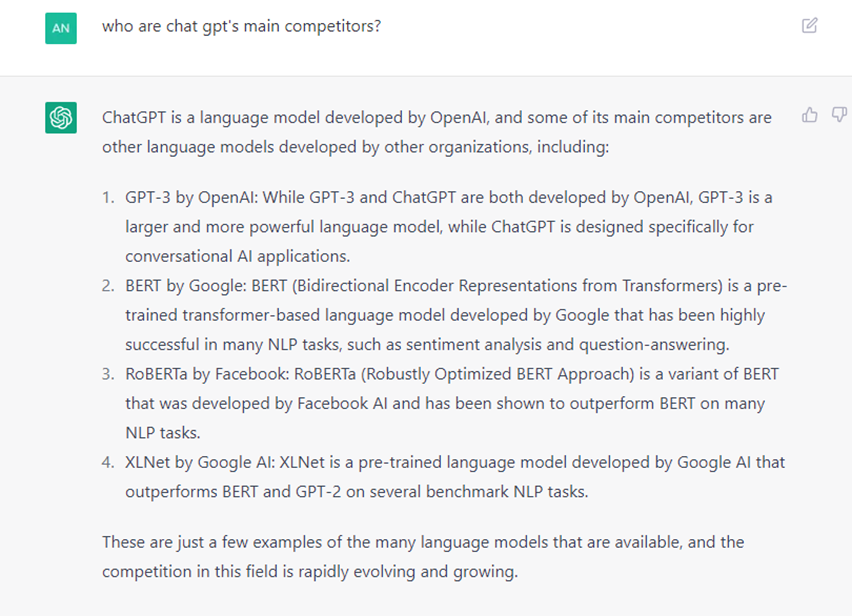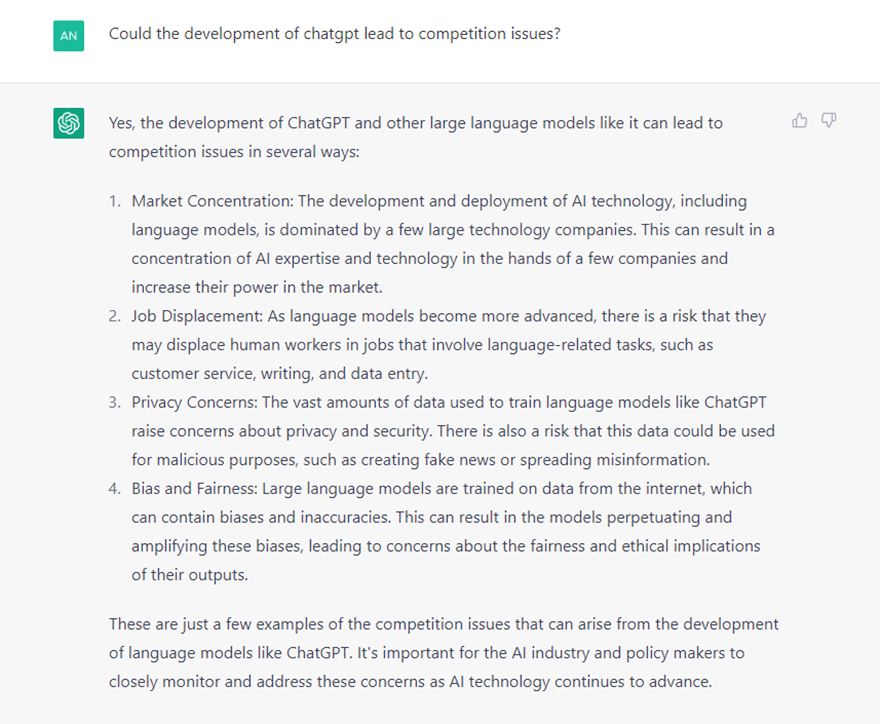In November 2022, OpenAI launched an artificial intelligence powered chatbot called ChatGPT which has to date attracted around 100 million users. Given the hype surrounding this new technology, we have given some thought to the competition issues which could emerge (with the help of… ChatGPT itself).
What is OpenAI and ChatGPT?
ChatGPT was created by OpenAI, a San-Francisco based start-up founded by Elon Musk and Sam Altman, initially as a non-profit organisation, but subsequently as a capped profit organisation. Its objective is to “ensure that artificial general intelligence benefits all of humanity” and it has already developed several AI models, including ChatGPT. Given the excitement about its potential, OpenAI has attracted important investors such as Microsoft who announced in January 2023 a new multi-year, $10 billion investment in OpenAI.
In ChatGPT’s own words, ChatGPT is “an AI-powered chatbot developed by OpenAI, based on the GPT (Generative Pretrained Transformer) language model. It uses deep learning techniques to generate human-like responses to text inputs in a conversational manner”. At present, ChatGPT is considered to be one of the largest and most powerful language processing AI models and is only expected to continue to grow in the future. Following on from its investment, Microsoft is said to be in the process of integrating ChatGPT-type technology into its search-engine Bing.
ChatGPT’s competitors and the competitive landscape
In order to understand the competitive landscape surrounding ChatGPT, we first asked ChatGPT itself:

As acknowledged in the answer, there are numerous other examples of similar AI technologies being developed in addition to the four main language models identified by ChatGPT. Big Tech players are battling it out to develop their own AI chatbots, including through significant investments, while independent start-ups are also working to develop alternative technologies. It is no wonder ChatGPT states that the “competition in this field is rapidly evolving and growing”.
However, within this dynamic sector, ChatGPT currently appears to be the most advanced and successful AI chatbot to date, with the highest number of users. Given constant improvements expected through its AI technology, it may be challenging for competitors to topple the ChatGPT as the early leader. It has been reported that even Google appears to have difficulty in making its chatbot works successfully.
What could be the competition risks related to the development of ChatGPT?
Given ChatGPT and other AI-chatbots are likely to become widely used in the coming years, we asked ChatGPT to predict what potential competition issues this could lead to.

As noted in our DigiLInks blog post, which challenged the quality of ChatGPT’s legal advice, the short response provided by ChatGPT does not give us all the answers – and rather identifies a range of broader concerns, common to the development of AI more generally.
At this stage, it is too early to say whether or not the development of ChatGPT will lead to competition concerns. However, we can still apply lessons learnt from the experience of how digital markets have evolved to date:
- Innovation is (in general) a good thing: the development of new technologies such as AI chatbots should generally be considered positive since it creates new products and services and can lead to a redistribution of market power between new and existing market players. Development of AI chatbots could lead to disruption for instance, in online search, where recent cases have found that Google obtained an unassailable market position.
- Artificial intelligence and machine learning can, however, have a mind of its own. OpenAI already states in its charter that if a project that aligns with its values is more advanced than its own projects, it will stop competing to instead assist the most advanced project. Unilateral behaviour such as this is not in itself problematic under competition rules, but may impact how these markets evolve.
- After an initial race for innovation, industry may stabilize due to first mover advantage with one or several undertakings retaining significant market power. Economies of scale could be achieved by companies involved in the AI chatbot industry. Technically speaking, AI programmes learn the most through gathering large amounts of data and improve exponentially with increased use. The first companies with successful AI tools that gain market traction - such as ChatGPT - are therefore likely to rapidly move into leading market positions.
- If one or several companies were to hold significant market power, interoperability may become an issue. Lessons could be learned from past investigations of Big Tech by competition authorities (e.g. Microsoft / Internet Explorer etc.), which investigated tactics aimed to protect incumbent positions by limiting interoperability with competing products and services. The available competition rules and future digital regulations (e.g. the Digital Market Act) will be important features to protect future competition.
- While the industry continues to grow, monetization of the use of AI chatbots could become a topic in itself. There have already been indications that ChatGPT plans to introduce a subscription model for its use. Monetization could take a number of forms: (i) on one side, users could pay to use the AI chatbot (with money and/or by providing their data to the chatbot for free) and (ii) on the other side, one could imagine that businesses could pay for the AI chatbot to make more references to them in their answers to users (in the same way as for paid referencing on online search engines) or to target users more generally.
Ultimately, it is unlikely that existing tech players will stand still while the AI chatbot industry is growing at such pace. The business model of existing tech players could be threatened by the growth of AI chatbots, including if they develop their own AI models, since the use of chatbots can potentially “cannibalize” part of their revenues in the event that users switch from search engines to AI chatbots (See Thibault Schrepel, Competition Is One Prompt Away February 2023).
Existing Big Tech players may further want to engage in cooperation/partnership agreements or try acquiring promising start-ups. OpenAI itself is far from a maverick disruptor as it already has been built off the back of significant investments from several tech companies. The role of competition law could be key to the evolution of this new landscape: for example enhanced merger control rules, such as through Article 22 EUMR, and future digital regulations could play an important role in determining who ultimately owns and controls this new technology.


/Passle/5c4b4157989b6f1634166cf2/MediaLibrary/Images/2026-01-28-11-42-24-951-6979f620da2c44bd51323e05.jpg)
/Passle/5c4b4157989b6f1634166cf2/SearchServiceImages/2026-02-26-09-59-52-439-69a019985e365c8f59bcd200.jpg)


/Passle/5c4b4157989b6f1634166cf2/SearchServiceImages/2026-02-26-11-29-56-314-69a02eb452230663c9b9705f.jpg)